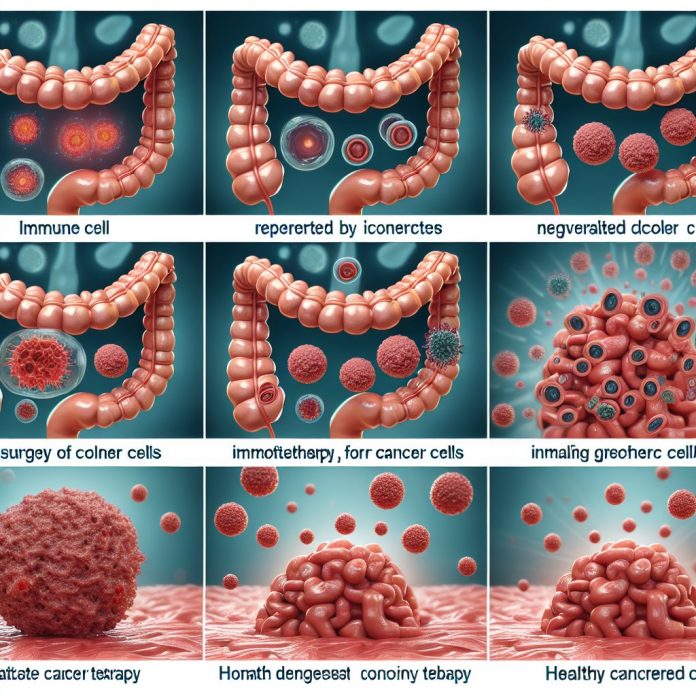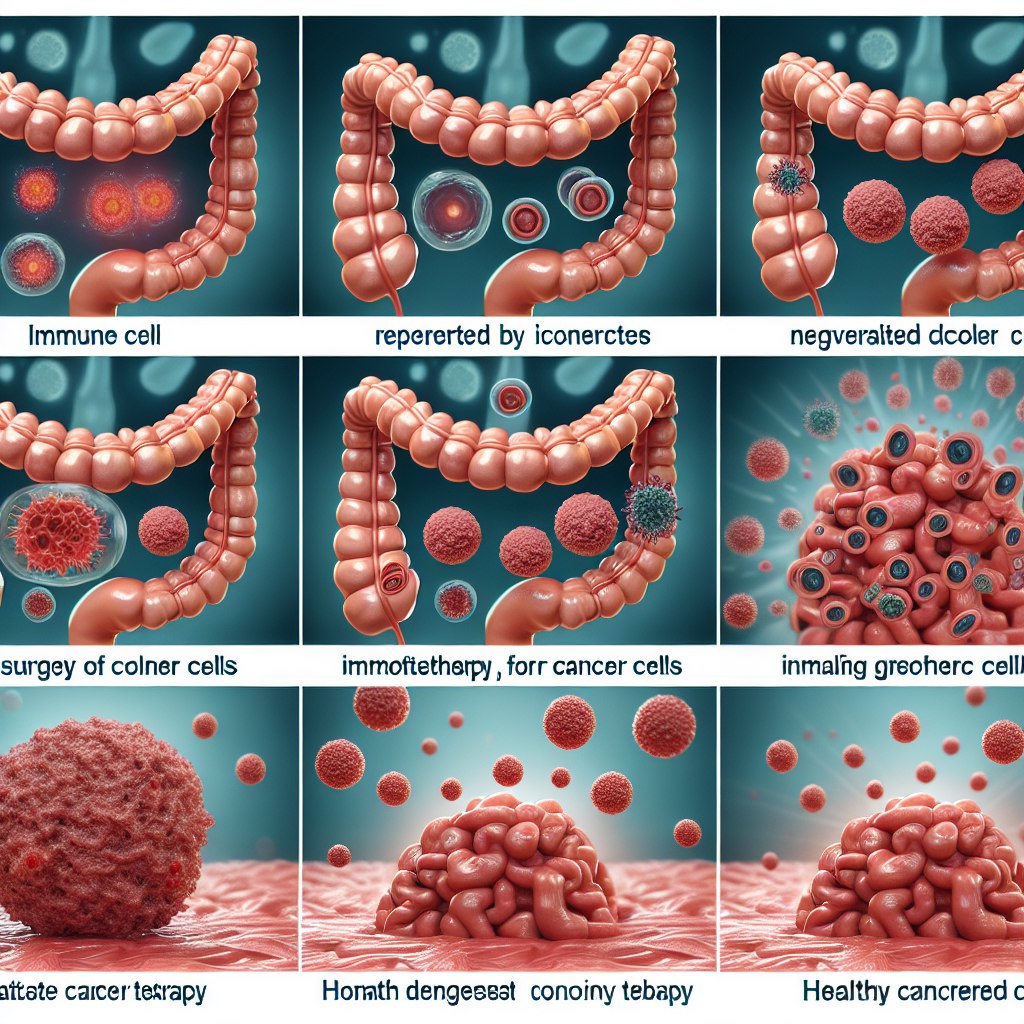
💊 Groundbreaking Findings A pair of immunotherapy drugs have shown impressive results in treating a subset of colorectal cancer known as mismatch repair-deficient (dMMR) colorectal cancer. This specific type of cancer is characterized by genetic mutations, which make it easier for the immune system to identify and attack.
🧬 Understanding dMMR Colorectal Cancer DMMR colorectal cancer is present in between 10-15% of all colorectal cancer patients. It is marked by a high number of mutations in genes responsible for repairing mistakes that can occur during DNA replication. While dMMR can appear in other forms of cancer, including breast and prostate, it is most commonly found in colorectal cancer.
🚫 Challenges in Treatment Treating DMMR colorectal cancer can be tricky. It tends to be more resistant to traditional chemotherapy, but recent research has shown promising results with immunotherapy.

🏥 Major Response in 98% of Patients Surgery is the primary treatment for colorectal cancer. However, a study published in the New England Journal of Medicine found that a pair of immunotherapy drugs administered before surgery significantly diminished tumor size without serious safety concerns. About 98% of patients underwent timely surgery, experiencing less than a two-week delay when taking the combination of drugs.
👨⚕️ Safety Profile and Side Effects Researchers aimed to study the safety profile of these drugs by observing whether patients who took them would still be able to undergo surgery within an allotted time frame. The study reported immune-related side effects in 73 patients, with severe events occurring in five patients. None of the patients discontinued treatment due to these adverse events.
📉 Tumor Reduction The effects of the drugs on the tumors were also surprising. The study found that 95% of patients experienced a major pathological response, shrinking the tumor to less than 10% of its size. Additionally, two-thirds of patients had a complete pathological response, meaning no residual evidence of the tumor was found after treatment.
🔍 Long-term Outcomes More than two years after surgery, no patients experienced a recurrence of the cancer. Patients continue to be followed to evaluate the durability of their response.
🗣️ Expert Opinions “I don’t think anybody expected these results or the extent of these results,” said Kristen Ciombor, MD, an Associate Professor of Medicine at Vanderbilt University Medical Center. “Two-thirds of patients didn’t have any tumor left, which is really incredible. It’s something that we don’t see at that rate and extent with pretty much any other therapy.”

🌍 Advances in Immunotherapy The study, conducted by researchers in the Netherlands, involved 115 patients with non-metastatic, locally advanced, previously untreated dMMR colon cancer. The drugs used, nivolumab and ipilimumab, belong to a class of immunotherapy treatments known as immune checkpoint inhibitors, but utilize unique biological mechanisms from one another.
📚 Historical Context “The greatest advance we’ve had in decades of cancer research has been in the field of immunotherapy. Developing immune treatments to help the immune system attack cancer is something that we’ve dreamed about since the 1950s,” said George Fisher, MD, PhD, a Professor of Medical Oncology at Stanford Medicine. The results of this latest trial demonstrate how far the field has come.
🔬 Mechanism of Action The concept of immunotherapy is simple to describe but extremely complex to implement. When the body mounts an immune response, it must identify friendly cells and foreign invaders. T cells, the body’s defenders in the immune response, perform a sort of “handshake,” known as an immune checkpoint, with healthy cells that mark them as safe. Some forms of cancer can abuse this mechanism to hide from the immune system, allowing them to grow unchecked.
🔑 Immune Checkpoint Inhibitors Immune checkpoint inhibitors work by preventing cancer cells from faking this “handshake” and allowing the immune system to identify and kill them. Colorectal cancer, in particular, tends to remain well hidden from immune system detection, but dMMR versions are different; their genetic mutations make them easier for the immune system to recognize and more susceptible to immunotherapies.
🧬 Genetic Mutations and Immune Response “If you have more mutations, then you make more abnormal proteins. And if the immune system is capable of recognizing abnormal proteins, then those cells that have the most mutations are the ones most likely to have proteins that might be recognized as foreign,” said Fisher. “The genetic mutations in these tumors make it what we call ‘immunologically hot.’ So the immunotherapy can work better against the tumor itself,” added Ciombor.
🔮 Implications of the Study Experts interviewed said that there is still much more work to do before it can be known if the immunotherapy treatments in the study will be safe and effective among a larger group of patients. However, the results are exciting. “There’s no doubt that this study is very impressive and the fact that we can see such tremendous changes in such a short interval of time with treatment with both drugs really suggests that there is likely to be a subset of patients who will not need to go to surgery,” said Fisher.
🏥 Potential for New Treatment Options Should trials continue to show safety and efficacy, certain groups of patients could have new options available to them. For example, older patients or those with certain comorbidities that make them unsuitable candidates for surgery might be able to opt for immunotherapy. Patients with low-grade cancer could also potentially elect not to have surgery, although the long-term outcomes of immunotherapy without surgery have not yet been established.
⚖️ Risk vs. Benefit As with any treatment, there will be a question of risk versus benefit. An immunotherapy treatment prior to surgery might preclude the necessity for chemotherapy but at the risk of a severe complication called immunotherapy toxicity. “It at least raises the possibility that there may be other options to treat this type of cancer,” said Ciombor.
💡 Future Directions “If you can avoid chemotherapy, that would be a win. Ultimately if you can avoid surgery too, then that’s really amazing. But we can’t draw that conclusion from this study yet. It’s going a little too far to say,” she said.
📈 Conclusion In a study involving over 100 patients, a dual-drug immunotherapy treatment shows impressive results in treating a specific form of colorectal cancer. Mismatch repair-deficient (dMMR) colorectal cancer is found in 10-15% of all colorectal cancer cases and is characterized by a high number of genetic mutations. These genetic mutations allow it to be more easily recognized by the immune system and make immunotherapy more likely to be effective.
The ongoing research and promising results suggest a bright future for immunotherapy in treating dMMR colorectal cancer, potentially providing new hope and options for patients battling this challenging disease.



















